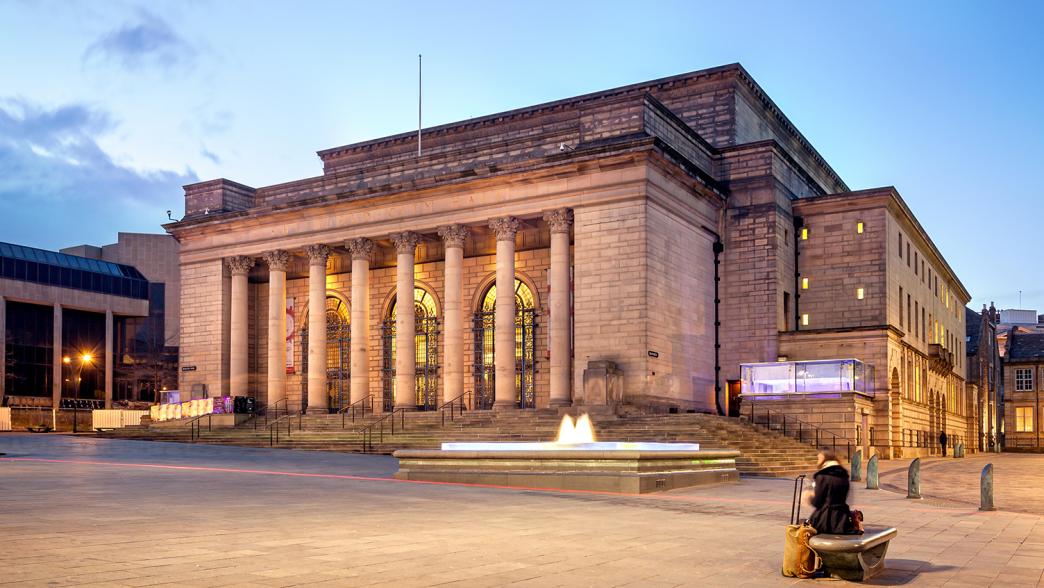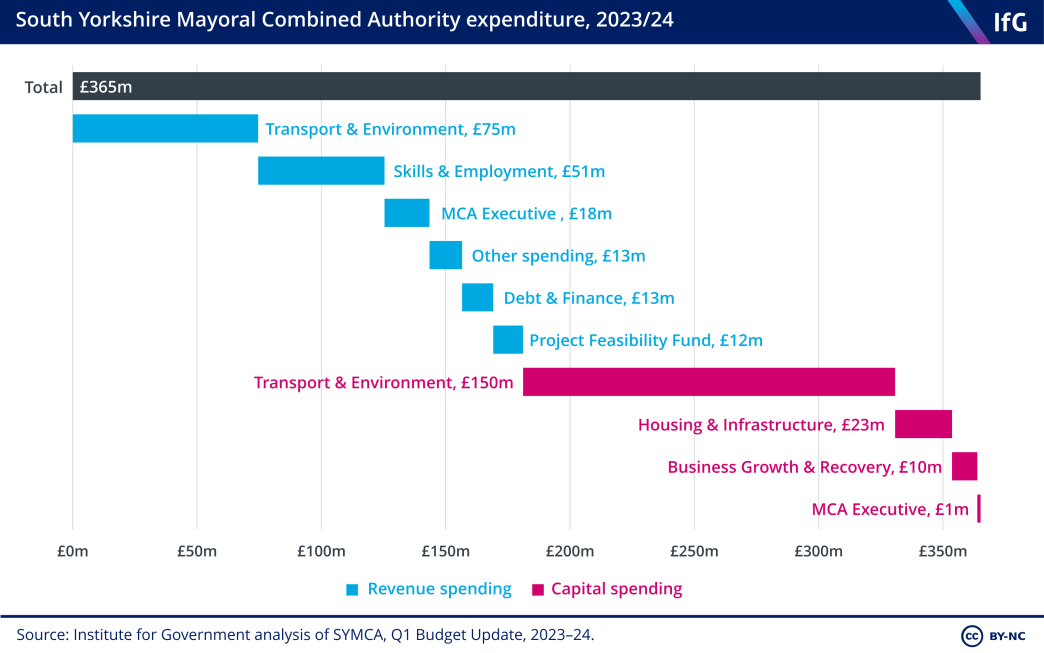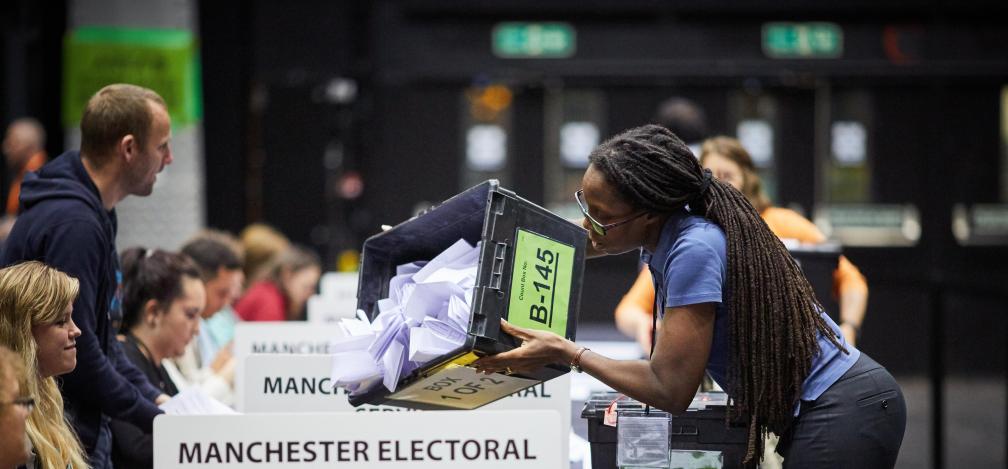Local elections 2024: Mayor of South Yorkshire
On 2 May 2024, voters in South Yorkshire elect their metro mayor.

On 2 May 2024, voters in South Yorkshire elect their metro mayor, who will lead the South Yorkshire Mayoral Combined Authority.
What is the South Yorkshire Mayoral Combined Authority?
The combined authority was established as a legal entity in April 2014 and has four constituent councils: Barnsley, Doncaster, Rotherham and Sheffield. As a combined authority, it gained the ability to take certain collective decisions across council boundaries.
Following its creation, agreement on a devolution deal for the area was reached between its four constituent local authorities and the UK government in October 2015. This led to the adoption of a directly elected mayor and mayoral election in May 2018, won by Barnsley MP Dan Jarvis, who did not seek re-election in 2022.
Although political leaders provisionally agreed the deal in October 2015, parliament did not approve the devolution of powers and funding until June 2020. The process was delayed as Barnsley and Doncaster initially voted for a wider ‘One Yorkshire’ deal, rather than just a South Yorkshire one. 15 Perraudin F, ‘Barnsley and Doncaster vote for ‘One Yorkshire’ devolution deal’, The Guardian, 21 December 2017, retrieved 11 April 2022, www.theguardian.com/uk-news/2017/dec/21/barnsley-and-doncaster-vote-for-one-yorkshire-devolution-deal
Five local authorities are non-constituent members of the combined authority: Bassetlaw, Chesterfield, North East Derbyshire, Derbyshire Dales and Bolsover. These members only have voting rights on certain issues relating to the wider region when constituent members resolve to give them a vote on these matters at the start of a SYMCA meeting.
The Labour Party is the dominant political party in the region, holding a majority on three of the four constituent councils. Sheffield currently has no overall control after Labour lost its majority at the 2021 local election. 16 BBC, ‘Election 2021: Sheffield City Council moves to no overall control as leader ousted’, BBC, 8 May 2021, retrieved 30 March 2022, www.bbc.co.uk/news/uk-england-south-yorkshire-57024385
The total population of the area covered by the constituent local authorities of SYMCA is 1.4m. Including non-constituent local authorities, the population of the region rises to 1.9m.
Who is standing to become mayor of South Yorkshire in May 2024?
The incumbent mayor of South Yorkshire is Oliver Coppard (Labour), who was elected in 2022 and is standing for a second term.
The Conservative candidate is Nicholas Allen, the Green candidate will be Douglas Johnson and the Liberal Democrats candidate is Hannah Kitching – all of whom are local councillors. David Bettney is also running for the Social Democratic Party.
The 2024 election will take place on the first-past-the-post system for the first time, after the previously-used supplementary vote system was scrapped by the Elections Act 2022. Turnout at the last mayoral election was just 26%, ranging from 20% in Doncaster to 32% in Sheffield.
What powers do the South Yorkshire mayor and combined authority hold?
The powers and responsibilities devolved to SYMCA and the metro mayor are focused on economic functions, including transport, infrastructure, business support, skills and planning.
On transport, SYMCA controls a consolidated, devolved budget covering local public transport, roads and active travel networks. The authority is seeking to use devolved powers to take control of the local bus system via a franchising scheme, and has already taken control of the local tram network. SYMCA is also responsible for the devolved 19+ adult education budget (AEB).
There is also a devolved power to create mayoral development areas to support economic regeneration. This requires the consent of the constituent council in which the area would be situated.
The mayor has the power to set a mayoral council tax precept (although this power has not been used) and has limited borrowing powers. 17 Department for Levelling Up, Housing and Communities, ‘Devolution: A mayor for South Yorkshire: What does it mean?’, Department for Levelling Up, Housing and Communities, 30 March 2022, https://assets.publishing.service.gov.uk/government/uploads/system/uploads/attachment_data/file/1064938/South_Yorkshire_Plain_English_Guide.pdf The mayor can exercise strategic planning powers, including undertaking compulsory purchase orders, with the consent of the constituent authority where the site is situated.
Generally, SYMCA decisions must be approved by a majority or 75% of SYMCA constituent authorities. Some decisions, such as the agreement of a statutory spatial framework, require unanimous support from constituent councils.
Following agreement with the government, the Mayor of South Yorkshire is taking on the powers of the police and crime commissioner from May 2024.
What is SYMCA’s budget?
As of July 2023, the SYMCA budget forecast for the 2023/24 financial year was reported as £365m, split almost equally between a £181m revenue budget and a £184m capital programme. 18 https://governance.southyorkshire-ca.gov.uk/mgConvert2PDF.aspx?ID=14817
Out of the revenue budget, the major spending programmes are transport (£75m) and skills and employment (£51m). The capital programme includes £150m on ‘transport and environment’ schemes, which was a reduction of £25m from the initial plans due to challenges in the delivery of certain transport schemes. SYMCA also expected to spend £22m on ‘housing and infrastructure’ investment.
The combined authority receives most of its funding from central government grants, supplemented by a transport levy paid to SYMCA by the four constituent authorities.
From 2024/25, the Mayor of South Yorkshire will also take on responsibility for oversight of the police in the region, whose budget in 2023/24 was forecast to be £236m, funded by a government police grant and a police precept on local council tax payers.

Local and mayoral elections 2024
On Thursday 2 May, voters across England and Wales will head to the polls in a major set of mayoral and local elections. Keep up with our latest content, events and analysis on why these elections matter and the results when they come.
Find out more
How does the SYMCA compare to the rest of the UK in terms of social and economic outcomes?
South Yorkshire performs comparatively poorly on many key social and economic metrics. In terms of labour productivity (GVA per hour) and gross household income, the region is about 20% below the UK average. In terms of social mobility, it is even further behind (71%).
The region also underperforms on adult skills. Only, 57% of 16–64 olds have a level three qualification or above, compared to 61% across the UK. Sheffield performs strongest in the region with almost 62% having a level three qualification. The lowest is Barnsley at 52%.
South Yorkshire has a lower proportion of houses (68%) that reach the decent homes standard than England as a whole (77%); this is true for all of constituent council areas though Sheffield performs the worst with only 65% of homes meeting the decent homes standard.
South Yorkshire has a lower male healthy life expectancy than the UK average. Men in the region on average live almost 60 healthy years compared to the national figure of 63 years. In Barnsley the figure is 56 years.
How does the SYMCA area overlap with other administrative boundaries?
Unlike some other MCA regions, the geography of the SYMCA is generally coterminous with other administrative boundaries. For example, the SYMCA was coterminous with the South Yorkshire Local Enterprise Partnership (LEP), which has been fully integrated into the combined authority.
The SYMCA area is also coterminous with the South Yorkshire Police area, which has enabled the mayor of South Yorkshire to take on the functions of police and crime commissioner from May 2024.
The South Yorkshire and Bassetlaw NHS Sustainability and Transformation Partnership (STP) covers the area of the SYMCA’s constituent local authorities, as well as the local authority of Bassetlaw, a non-constituent council of the SYMCA. 20 NHS, ‘Health and care in South Yorkshire and Bassetlaw: Sustainability and Transformation Plan – a summary’, no date given, retrieved 30 March 2022, http://smybndccgs.nhs.uk/application/files/9514/8041/4423/South_Yorkshire_and_Bassetlaw_STP_-_a_summary_.pdf STPs bring together local authorities and NHS organisations to facilitate the development of ‘place-based’ approaches to the delivery of NHS services in given regions.
- Topic
- Devolution
- Position
- Metro mayor
- English Regions
- Yorkshire and the Humber
- Combined authorities
- South Yorkshire Mayoral Combined Authority
- Publisher
- Institute for Government